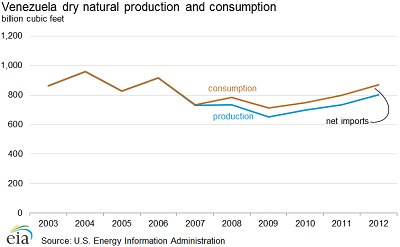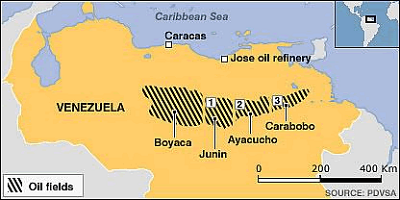Venezuela Wants Offshore Gas Development
Venezuela has the second-largest natural gas reserves in the Americas, behind the United States. Much of the natural gas is used to bolster production in its mature oil fields.
 Since 2003, the petroleum industry has consumed about 40 percent of Venezuela’s gross natural gas production, primarily for gas reinjection to bolster crude oil extraction. Because of the declining output of mature oil fields, natural gas use for enhanced oil recovery has increased by 42 percent since 2005.
Since 2003, the petroleum industry has consumed about 40 percent of Venezuela’s gross natural gas production, primarily for gas reinjection to bolster crude oil extraction. Because of the declining output of mature oil fields, natural gas use for enhanced oil recovery has increased by 42 percent since 2005.
To meet the growing industrial demand for natural gas, Venezuela imports gas from Colombia and the United States. The government has prioritized developing domestic natural gas production for industrial uses as well as residential and commercial markets, and is developing its gas infrastructure in support of this effort.
Petroleos de Venezuela S.A. (PDVSA), the country’s state-run oil and natural gas company, produces the largest amount of natural gas in Venezuela, and it is also the largest natural gas distributor. A number of private companies also currently operate in Venezuela's gas sector. Participants with significant assets include Repsol-YPF, Chevron, and Statoil.
 An estimated 90 percent of Venezuela’s natural gas reserves are associated, meaning they are located in the same place as oil reserves. Following Chavez’s announcement of the Socialist Gas Revolution in 2009, the Energy and Petroleum Ministry announced plans to increase natural gas production to roughly 14 billion cubic feet per day (Bcf/d) and to begin exporting natural gas by 2015.
An estimated 90 percent of Venezuela’s natural gas reserves are associated, meaning they are located in the same place as oil reserves. Following Chavez’s announcement of the Socialist Gas Revolution in 2009, the Energy and Petroleum Ministry announced plans to increase natural gas production to roughly 14 billion cubic feet per day (Bcf/d) and to begin exporting natural gas by 2015.
Currently, Venezuela is working to increase the production of non associated gas, largely through the development of its offshore reserves. Offshore, PDVSA has awarded exploration blocks to international oil companies, including Total, Statoil, and Chevron, in the Plataforma Deltana, Marsical Sucre, and Blanquilla-Tortuga areas off Venezuela’s northeast coast. Venezuela has also awarded exploratory blocks to Gazprom and Chevron to develop the potential 26 Tcf gas blocks in the Gulf of Venezuela in the northwestern part of the country.

that matters most
Get the latest maritime news delivered to your inbox daily.
Offshore exploration has yielded many successful finds, including Repsol-YPF and ENI’s discovery of 6-8 Tcf of recoverable natural gas in the Cardon IV block in the Gulf of Venezuela, one of the largest natural gas discoveries in the history of the country. In early 2014, Eni announced gas production would begin in 2015 at their Perla field project with estimated reserves of 15 Tcf of natural gas.
PDVSA had also found a field with a potential 7.7 Tcf gas reserve at Tia Juana Lago in the Sur area. For Venezuela’s offshore gas development to move forward, international partners will need to play a central role in production. PDVSA does not have experience in producing non associated gas—the company’s most recent attempt at operating an offshore natural gas project resulted in the sinking of the Aban Pearl semi-submersible drilling rig in May 2010.
